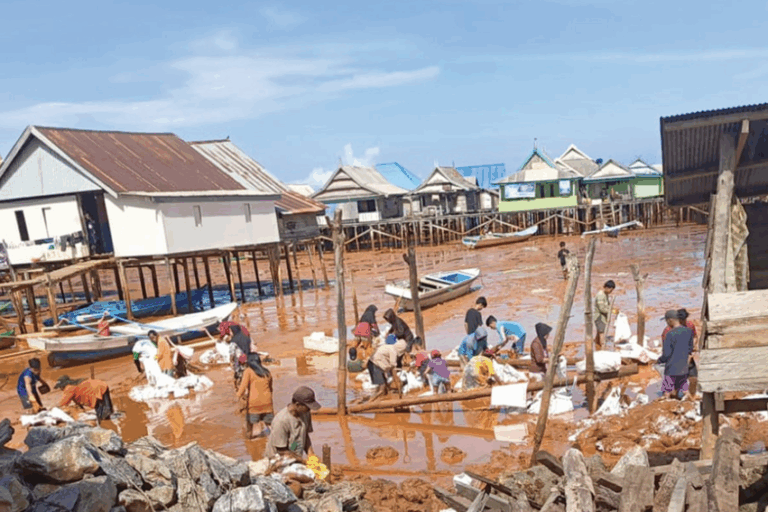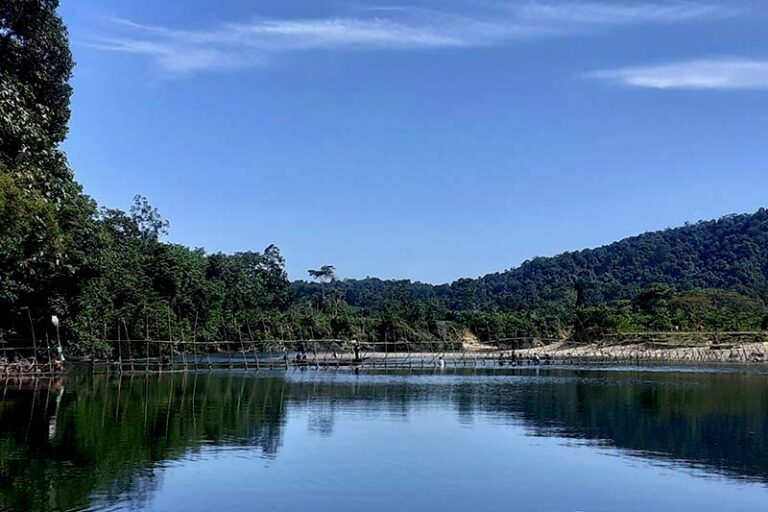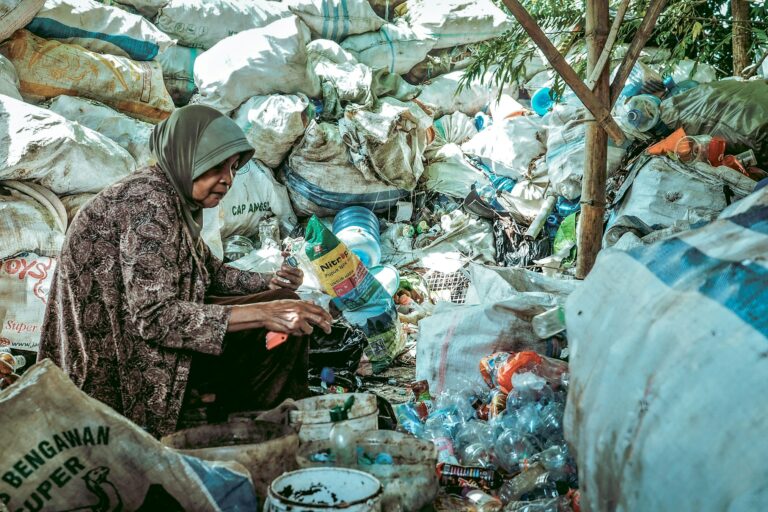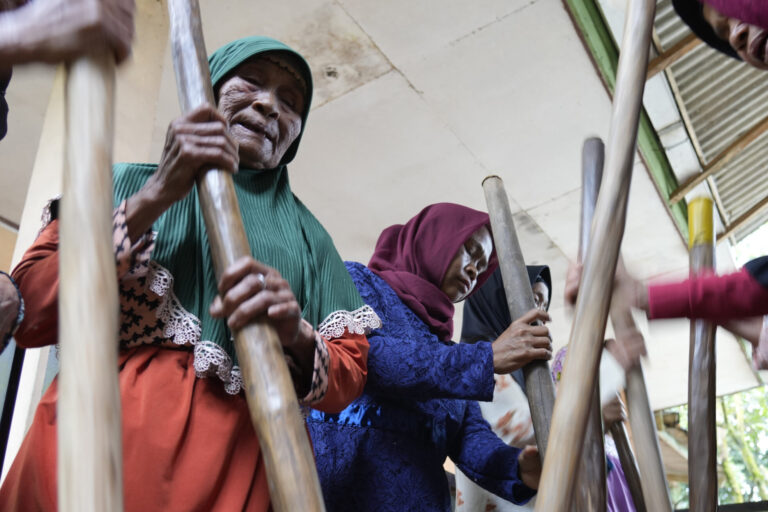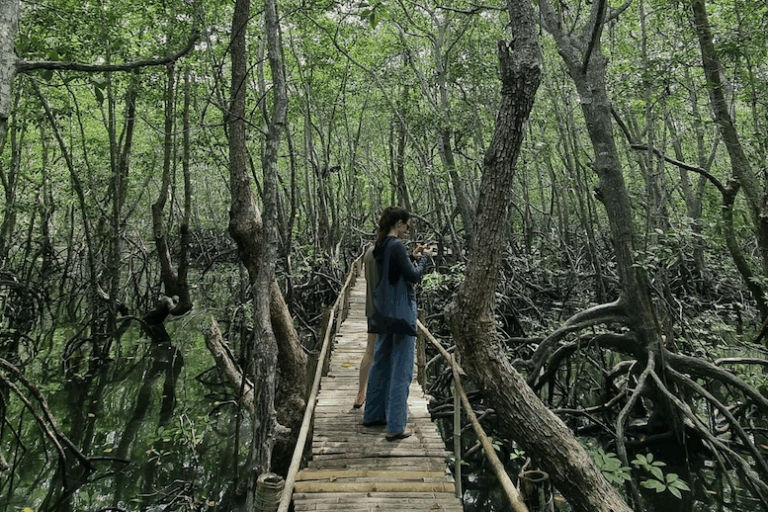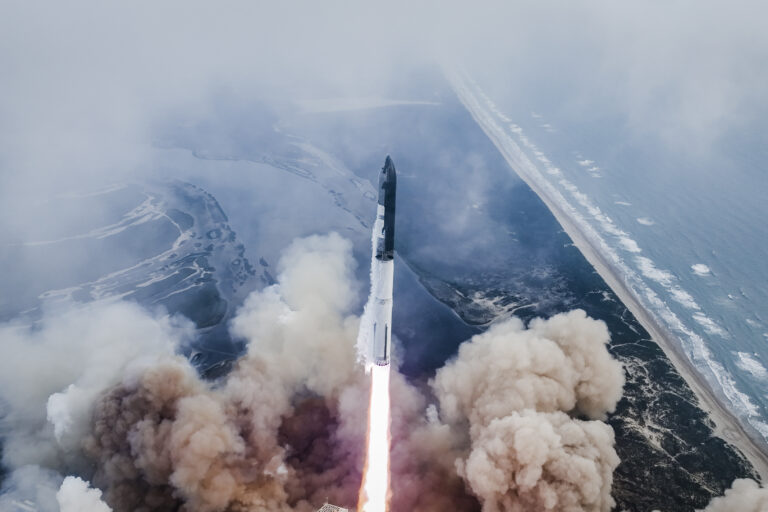- Nickel mining on Indonesia’s Kabaena Island has polluted the sea, degraded forests and disrupted the lives of Indigenous Bajau fishers and farmers, who have reported severe drops in income, fish catches and seaweed quality.
- The mining has harmed biodiversity, threatening leatherback turtle nesting sites and the island’s unique long-tailed macaques, while also causing health issues among locals, including skin and respiratory problems, according to a report by NGOs.
- Affected communities report land seizures without proper consultation or compensation, limited public participation, and criminalization of protests, all in violation of Indigenous rights and national laws.
- The report ties the mining firms to political elites and global EV supply chains, including alleged links to Tesla and Ford, and calls for mining permit audits, stronger protections for affected communities and full accountability from companies.
JAKARTA — Kasman Amir grew up in a fishing family in a small coastal village on Kabaena Island in eastern Indonesia. The family home sat on stilts above the water, and he recalled waking up to the sound of the boat engine.
The village, home to the nomadic Bajau sea tribe — whose culture inspired the Hollywood movie Avatar: The Way of Water — was once surrounded by clear waters that allowed children to play freely.
“As kids, we loved playing in the water—swimming, paddling canoes. That was our fun,” Kasman told reporters at a recent press conference in Jakarta.
But since 2010, the sea has turned red, allegedly due to runoff from nickel mining, which has expanded across the island.
“Now, I never see children swim in the sea. They’re afraid of contamination,” Kasman said. “After school, we’d go fishing right in front of our homes. We’d catch ikan baronang [rabbitfish, genus Siganus], and sell them for pocket money. Children today no longer experience that freedom.”

Kasman’s village is one of the many on the tiny island of Kabaena, at the southeastern tip of the larger island of Sulawesi, that have been severely impacted by nickel mining, according to a new report by environmental local NGOs Satya Bumi, Walhi and Sagori.
The report follows a 2024 investigation that focused on the environmental and social impact of nickel mining in the northern part of the island. This time, the report focused on the southern part, specifically the district of Buton Tengah, which has been largely neglected in public discourse about the impacts of mining.
Three nickel companies — PT Arga Morini Indah (AMI), PT Arga Morini Indotama (AMINDO) and PT Anugrah Harisma Barakah (AHB) — have caused major environmental and social harm, the report says.
It found 506 and 194 hectares (1,250 and 480 acres) of deforestation within AMI and AMINDO’s concessions, respectively, between 2001 and 2024. Much of this forest clearing was in hilly areas, leaving the denuded land highly prone to erosion and landslides.
Mining activity has resulted in severe coastal sedimentation and polluted the sea, with 98.4% of residents surveyed by the NGOs saying their environment had been harmed.

Biodiversity threat
The coastal sedimentation threatens the rich biodiversity of the region, said Satya Bumi campaigner Dhany Alfalah.
Southern Kabaena is a stopping point for the leatherback sea turtle (Dermochelys coriacea), the largest of all living turtles, as it migrates west from the island of New Guinea to nest. It’s also the only island in the Sulawesi archipelago with a native population of long-tailed macaques (those on the main island were introduced there). The long-tailed macaque (Macaca fascicularis) is the most widely traded primate species in the world, with demand from the biomedical research industry responsible for driving its conservation status to endangered.
On Kabaena, the macaque population is confined to coastal areas that cover just a quarter of the island’s total area. In the village of Kokoe, residents said macaque sightings have become rare over the past 20 years, according to the report.

Impacts on livelihood
Mining activity has also affected the primary livelihoods of local communities, especially Bajau fishers and seaweed farmers. In four of the affected villages — Kokoe, Liwu Lompona, Talaga Besar and Wulu — household incomes dropped by up to 69.4%, according to the report.
Bajau fishers in Kokoe, for instance, reported an 80% drop in octopus catch. Typical catches went from an average of 10 kilograms (22 pounds) to just 1-2 kg (2.2-4.4 lbs) per fishing trip, reportedly because of the degradation of marine ecosystems.
Similarly, seaweed farmers in Talaga Besar saw drastic declines in crop quality, with the price they can fetch per kilo falling by 90%.

Health issues
Nickel mining has also reportedly given rise to health issues. More than two-fifths of surveyed residents reported illnesses such as skin diseases and respiratory problems, which they attributed to mining dust and water contamination.
In the village of Wulu, where residential areas are located just 400 meters (a quarter of a mile) from mining operations, respiratory complaints were particularly high. In Talaga Besar, changes in seawater color and reports of itchiness during seaweed harvesting indicate pollution caused by mining sedimentation.
Yayan, a fisherman from Kokoe, said he dives daily to catch octopus, but that since the waters became polluted, he has developed skin conditions such as persistent itchiness, which he blamed on prolonged exposure to contaminated seawater.
“Ever since the mining companies came, the impact has been very noticeable,” Yayan said.
“I have to go farther out to sea to find octopus because the waters nearby have turned red. I used to only go 1-2 kilometers [0.6-1.2 mi] from shore, now the closest is around 4-5 kilometers [2.5-3 mi]. I feel itchy on my back, neck and legs. I’ve treated it, but only with ointment.”

Lack of consent
The report also found that public participation in decision-making has been extremely limited, with 69.4% of surveyed residents saying the mining companies never engaged them in a process to obtain their free, prior and informed consent (FPIC).
FPIC is a legal requirement for any extractive activity under the U.N. Declaration on the Rights of Indigenous Peoples (UNDRIP), which Indonesia has signed.
The lack of FPIC has spawned land conflicts between the Kabaena communities and the mining companies. Almost all interviewed farmers reported that their land had been seized by the companies without proper consultation or compensation.
In the case of AMI, which arrived on the island in 2007, affected communities say they were owed compensation of 14 billion rupiah (nearly $1.5 million at the exchange rate at the time). To date, however, the report says the company still owes them 4.6 billion rupiah, or $282,000 at the current exchange rate.
Of the small number of affected residents who received compensation, the payout wasn’t commensurate with their losses, the report noted, adding that residents who attempted to claim their rights often faced criminalization. Hanasiah, a woman from the village of Liwu Lompona, was charged with criminal vandalism of AMI’s property during a protest and sentenced to seven months in prison in 2010.
“I was accused of cutting the rope of the company’s barge. At the time, my child was only six months old, still nursing, and the umbilical cord hadn’t even fully detached,” she said as quoted in the report. “They said compensation would be paid, and installments began in 2012, but they stopped for five years — and even now, it’s still not fully paid.”

Threat of expansion
The conflicts and environmental destruction could worsen as the government proposes rezoning of the region’s forests to allow for the expansion of mining areas and the addition of nickel smelters.
“These changes risk amplifying the already ongoing ecological and social impacts, especially in Kabaena, which is categorized as a small island,” the report noted.
AHB, one of the three mining companies, hasn’t started mining yet. It holds a concession of 2,527 hectares (6,244 acres), of which 18.59 hectares (46 acres) overlaps with protected forest — a potential violation of the 1999 Forestry Law.
Taqiuddin, the forestry ministry official in charge of enforcing zoning rules, said his office would investigate whether AHB is in violation.
“According to the rules, mining activities in forests must have permits and can only take place in production forests — not in protected forests,” he said at the launch of the NGOs’ report in Jakarta in June.
The report suggests the operations of all three companies on Kabaena may violate national law, which prohibits mining on small islands. The report also found strong indications that AHB is preparing to expand its operations in Buton Tengah district, based on field measurements, community interactions and satellite imagery of new roads opened between April 2024 and April 2025.

Local elites, global supply chains
The report links Kabaena’s mining firms to powerful political figures, which could explain why the firms are able to operate with impunity.
Both AMI and AMINDO are reportedly controlled by a high-ranking former police officer, Achmad Fachruz Zaman, who has ties to the current governor of Southeast Sulawesi province, Andi Sumangerukka, according to the report.
The report also links AMI and AMINDO to Arif Kurniawan, who is closely connected to the governor’s wife, Arinta Nila Hapsari.
AHB has been linked to controversial businessman Haji Isam, owner of the Jhonlin Group — a conglomerate with interests in coal mining, oil palm plantations and more — who is reportedly connected to five ministers in the current Indonesian cabinet.
“When influential people are behind these companies, they tend to operate more freely,” Dhany of Satya Bumi said. “We interviewed residents who told us that during every ore extraction, police officers are present to accompany the operation.”
The NGOs traced the nickel mined in Kabaena to smelters operated by PT Virtue Dragon Nickel Industry (VDNI), a Chinese-controlled company, in Konawe, on the Sulawesi mainland. There, it’s processed into battery-grade nickel, which the report suggests is then sourced by companies like China’s CNGR and Huayou Cobalt — suppliers to Tesla and Ford, respectively.
Tesla’s 2023 report doesn’t mention direct links, but supply chain transparency in the battery industry globally remains poor, raising serious questions about accountability and due diligence.

Online attacks
Following the publication of the report in June 2025, Satya Bumi’s website was hit with a DDoS (distributed denial of service) attack and hacking attempts on its Instagram and TikTok accounts. Walhi’s Southeast Sulawesi chapter was also targeted by digital attacks.
Satya Bumi attributed the attacks to the publication of the report, noting that they occurred on the same day that unidentified individuals contacted an online student publication to demand it take down an article about the report’s findings. Satya Bumi said all information presented in the report, and the subsequent coverage by the outlet Objektif.id, was based on research that’s verifiable and accountable.
Any demand to suppress it, therefore, would constitute suppressions of press freedom, of independent research, and of Indonesia’s democratic space, Satya Bumi said.
“These digital attacks and attempts to muzzle the media are a thorn in the side of democracy,” the NGO said. “They not only damage the democratic space, but also tarnish the image of the state in protecting its citizens — citizens who strive to ensure that human rights are upheld in governance.
“Rather than silencing critical voices, those accused should simply prove that they are not violating or infringing on human rights,” it added.

Recommendations
As Kabaena continues to be degraded by nickel mining, the report urges the Indonesian government to audit all mining permits issued for the island, particularly those overlapping with protected forests.
It also calls for amending Article 162 of the 2020 Mining Law — which prescribes criminal sanctions for anyone “who obstructs or interferes with mining business activities that have met the requirements” — saying it’s frequently misused to persecute environmental defenders. The report also emphasizes the need to ensure transparent public participation in any attempt to revise forest zoning plans.
For the three mining firms named in the report, the NGOs called for a halt to all activities, the restoration of damaged environments, fair compensation to affected landowners, and disclosure of whether community consent was obtained through an FPIC process.
They also called on Tesla, Ford and other companies potentially part of the Kabaena nickel supply chain to reassess their supplier relationships. The NGOs urged them to end partnerships with harmful firms, disclose supply chain actors, and conduct robust due diligence, including environmental and human rights risk assessments and local stakeholder engagement.
Banner image: The process of collecting mining sludge caused by nickel mining in Baliara village, Kabaena Island, Southeast Sulawesi.
FEEDBACK: Use this form to send a message to the author of this post. If you want to post a public comment, you can do that at the bottom of the page.









